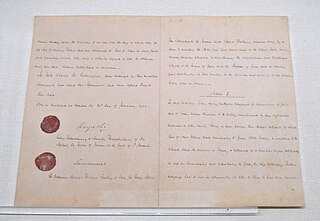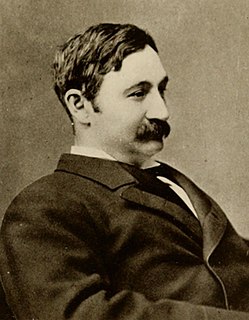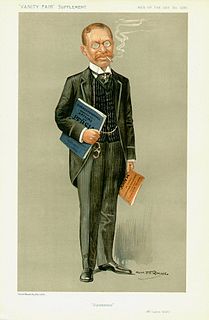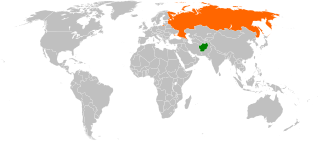
The European influence in Afghanistan refers to political, social, and mostly imperialistic influence several European nations and colonial powers have had on the historical development of Afghanistan.

"The Great Game" was a political and diplomatic confrontation that existed for most of the 19th century between the United Kingdom and the Russian Empire, over Afghanistan and neighbouring territories in Central and South Asia. It also had direct consequences in Persia and India. Britain was fearful of Russia invading India to add to the vast empire that Russia was building in Asia. As a result, there was a deep atmosphere of distrust and the talk of war between the two empires. Britain made it a high priority to protect all the approaches to India, and the "great game" is primarily how the British did this. Historians with access to the archives have concluded that Russia had no plans involving India, as the Russians repeatedly stated.

The Treaty of Berlin was signed on 13 July 1878. In the aftermath of the Russian victory against the Ottoman Empire in the Russo-Turkish War of 1877–1878, the major powers restructured the map of the Balkan region. They reversed some of the extreme gains claimed by Russia in the preliminary Treaty of San Stefano, but the Ottomans lost their major holdings in Europe. It was one of three major peace agreements in the period after the 1815 Congress of Vienna. It was the final act of the Congress of Berlin and included Great Britain and Ireland, Austria-Hungary, France, Germany, Italy, Russia and the Ottoman Empire. Germany's Otto von Bismarck was the chairman and dominant personality.

The Franco-Russian Alliance, or Russo-French Rapprochement, was an alliance formed by the agreements of 1891–94; it lasted until 1917. The strengthening of the German Empire, the creation of the Triple Alliance of 1882, and the exacerbation of Franco-German and Russo-German contradictions at the end of the 1880s led to a common foreign policy and mutual strategic military interests between France and Russia. The development of financial ties between the two countries created the economic prerequisites for the Russo-French Alliance.

The first Anglo-Japanese Alliance was an alliance between Britain and Japan, signed in January 1902. The alliance was signed in London at Lansdowne House on 30 January 1902 by Lord Lansdowne, British foreign secretary, and Hayashi Tadasu, Japanese diplomat. A diplomatic milestone that saw an end to Britain's splendid isolation, the alliance was renewed and expanded in scope twice, in 1905 and 1911, before its demise in 1921 and termination in 1923. The main threat for both sides was from Russia. The threat of war with Britain prevented France from joining its ally Russia in the Russo-Japanese War of 1904. However, it angered the United States and some British dominions, which were hostile to Japan.

Colonel Frederick Gustavus Burnaby was a British Army intelligence officer. Burnaby's adventurous spirit, pioneering achievements, and swashbuckling courage earned an affection in the minds of Victorian imperial idealists. As well as travelling across Europe and Central Asia, he mastered ballooning, spoke a number of foreign languages fluently, stood for parliament twice, published several books, and was admired and feted by the women of London high society. His popularity was legendary, appearing in a number of stories and tales of empire.

Sir Henry Mortimer Durand, was a British diplomat and civil servant of colonial British India.

Khorāsān, sometimes called Greater Khorasan, is a historical region which formed the northeast province of Greater Iran. The name signifies "the Land of the Sun" or "the Eastern Province".

The Panjdeh incident of 1885 was a diplomatic crisis between the British Empire and the Russian Empire caused by the Russian expansion south-eastwards towards the Emirate of Afghanistan and the British Raj (India). After nearly completing the Russian conquest of Central Asia the Russians captured an Afghan border fort. Seeing a threat to India, Britain came close to threatening war but both sides backed down and the matter was settled by diplomacy. The effect was to stop further Russian expansion in Asia, except for the Pamir Mountains and to define the north-western border of Afghanistan.

The Treaty of Gandamak was signed on 26 May 1879 to officially end the first phase of the Second Anglo-Afghan War. Under the treaty, the Afghan Emir, Mohammad Yaqub Khan, ceded various frontier areas to the British Raj, including Quetta, Pishin, Harnai, Sibi, Kurram, and Khyber, while retaining sovereignty over the rest of Afghanistan.
Edmund O'Donovan, Irish war correspondent, was born in Dublin. In 1866 he began to contribute to The Irish Times and other Dublin papers. He was the first journalist killed in the Kurdufan area during the Sudan campaigns while reporting for The Daily News.

The Principality of Bulgaria was a de facto independent, and de jure vassal state under the suzerainty of the Ottoman Empire. It was established by the Treaty of Berlin in 1878.

Lucien Wolf was an English Jewish journalist, diplomat, historian, and advocate of rights for Jews and other minorities. While Wolf was devoted to minority rights, he opposed Jewish nationalism as expressed in Zionism, which he regarded an incentive to anti-Semitism. In 1917 he co-founded the anti-Zionist League of British Jews.

Bulgarian Crisis refers to a series of events in the Balkans between 1885 and 1888 which impacted on the balance of power between the Great Powers and conflict between the Austro-Hungarians and the Russians. It was an episode in the continuing Balkan Crisis as vassal states struggled for independence from the Ottoman Empire but achieved a mosaic of nascent nation states (Balkanisation) and featured unstable alliances that frequently led to war, and eventually to the First World War.

The Emirate of Afghanistan was an emirate between Central Asia and South Asia, which is now today's Afghanistan and some parts of Pakistan. The emirate emerged from the Durrani Empire, when Dost Mohammed Khan, the founder of the Barakzai dynasty in Kabul, prevailed. The history of the Emirate was dominated by 'the Great Game' between the Russian Empire and the United Kingdom for supremacy in Central Asia. This period was characterized by the European influence in Afghanistan. The Emirate of Afghanistan continued the war with the Sikh Empire, which led to the First Anglo-Afghan War by British forces. The war eventually resulted in victory for Afghans with the British withdrawal and Dost Mohammad being reinstalled to the throne. However, during the Second Anglo-Afghan War (1880), the British defeated the Afghans and this time the British conquered many Afghan territories within modern-day Pakistan and took control of Afghanistan's foreign affairs until Emir Amanullah Khan regained them after the Anglo-Afghan Treaty of 1919 was signed following the Third Anglo-Afghan War.

Afghanistan–Russia relations are the relations between the nations of Afghanistan and Russia. These relations are independent of the "Great Game" which consists of Russian–British confrontations over Afghanistan since 1840. On 28 February 1921, Afghanistan and Soviet Russia signed a Friendship Treaty. The Soviet Union was the first country to recognize Afghanistan's independence following the Third Anglo-Afghan War in 1919.

General Mikhail Nikolayevich Annenkov was a Russian nobleman, author, military officer, and renowned engineer. An important figure in the history of the Russian conquest of Turkestan in the 19th Century, he was Governor-General of the Transcaspian Region.
George Forster was an English traveller and civil servant of the East India Company, on the Madras establishment. He has sometimes been confused with Johann Georg Adam Forster. He is notable for being the first Briton to have journeyed from India through Central Asia to Russia and published a journal of his travels.

Afghanistan–United Kingdom relations refer to bilateral relations between Islamic Republic of Afghanistan and United Kingdom of Great Britain and Northern Ireland. There has been an Afghan embassy in London since 1922 though there was no accredited Afghan ambassador from 1981 to 2001.

The Russian conquest of Central Asia took place in the second half of the nineteenth century. The land that became Russian Turkestan and later Soviet Central Asia is now divided between Kazakhstan in the north, Uzbekistan across the center, Kyrgyzstan in the east, Tajikistan in the southeast and Turkmenistan in the southwest. The area was called Turkestan because most of its inhabitants spoke Turkic languages with the exception of Tajikistan, which speaks an Iranian language.


















